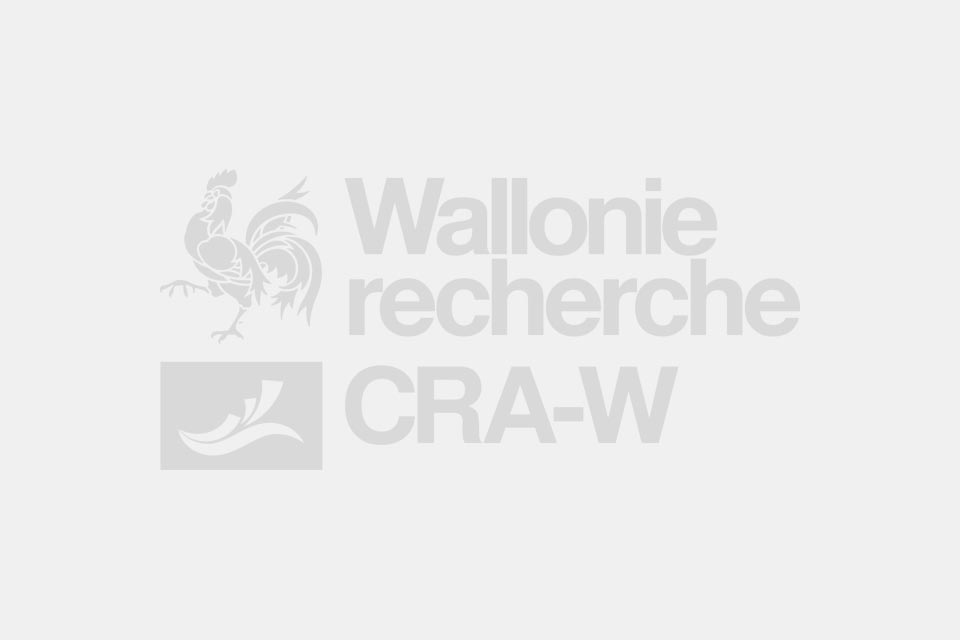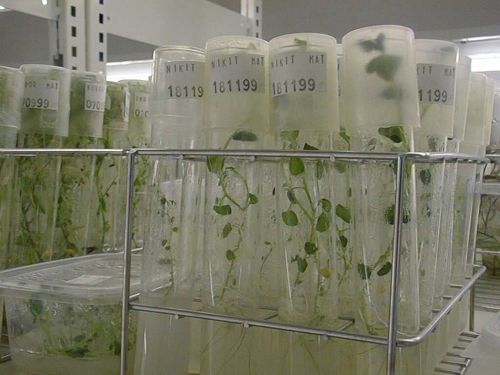Context
The in vitro micropropagation techniques of potato were widely accepted in the last decade as basic techniques for the supplying of the potato seeds production sector. Current sanitary conditions (risk of introduction into the farms of quarantine diseases by the importation of basic potato seeds from contaminated areas - Clavibacter michiganensis spp. sepedonicus, Ralstonia solanacearum) is pushing the producers to develop their own pre-basic and basic potato seeds productions with an in vitro origin. Since about fifteen years, the Farming Systems Section develops the in vitro potato micropropagation techniques and provides the growers with this initial material.Objectives
The general objective of this project is to seek and develop germplasm keeping and initial material production techniques, in order to give a significant support to the production sector. On the level of the Farming Systems Section, the various research orientations that will be studied are :
- the in vitro potato conservation. More than 300 varieties are preserved in the laboratory of the Section. All this material is fully pathogen tested and can constitute the starting point for the production of healthy initial material intended to be distributed to the potato seeds production sector. The potato varieties are maintained in the form of vitroplants on Murashige and Skoog medium under a photoperiod of 16h/8h and 20°C. Conservation techniques allowing us to increase the intervals between two maintenance periods have to be developped in order to decrease the workload
- the minituberization in hydroponic systems. From the vitroplants, producing minitubers (photo 1) constitutes the most frequent way for the supplying of the production sector. Soilless minitubers production was developed in our service but has still to be improved in order to increase the economic efficiency (obtaining a maximum of minitubers of marketable size per area unit). This objective can be achieved by optimizing the mineral and hormonal nutrition of the plants.
- The use of mineral substrates in place of organic ones for the vitroplants acclimatization and rooting before the transfert to the open field have to be tested because it can improve the garantees for a better sanitary quality.
- the in vitro tuberization leading to the production of vitrotubers or microtubers. This technique is a very simple and inexpensive. Contrary to the production of minitubers, it does not require the use of expensive infrastructures like greenhouses. This technique gets also a maximum of sanitary guarantee because all the production process is completed in the laboratory. However, the reduced size of the vitrotubers prevents their practical use in the multiplication fields. The objective will be thus to develop new techniques of production allowing the increase of their average size. The production in bio-reactors of greater volume by using the temporary immersion technique will be particularly studied. Complementary, the use, in the media, of hormones promoting the tuberization process will also be tested.
Expected results
Improvements still remain to be provided within the laboratory for a better management of the germplasm A new hydroponic production unit for minitubers production, completely isolated from others potato activities, is in building phase and will ensure the produced quality.Initial material in the form of minitubers, acclimatized and rooted plantlets or vitrotubers of the best sanitary quality will be placed at seeds potato growers disposal.Larger use of this material among the potato seeds farms will improve the general sanitary quality of the potato seeds production in our region.
Results obtained
- Collection of 350 potato varieties maintained in vitro (photo 2).
- Potato micropropagation techniques : cleaning up and regeneration techniques, vitroplants and vitrotubers production techniques.
- Accclimatization techniques : rooted plantlets for the direct transfer to the field, soilless minitubers production in hydropony.
- Supplying of the production sector in Wallonia: more than 180 lots of minitubers, vitrotubers or rooted plantlets of various varieties (each one constituted of a few hundreds to several thousands of units) were distributed in 2004, 2005 and 2006.
- Many contacts with foreign countries (Romania, Bulgaria, Burundi, Rwanda, Burkina Faso, Mali, Guinea, China, France, Netherlands, Luxembourg).
- Projects in developping countries: Senegal and Algeria.
Contribution
Farming Systems Section : management of the project, in vitro culture and conservation, cleaning up techniques, hydroponic systems, acclimatization, virus tests (PVY, PVX, PVM, PVA, PVS, PLRV), …
Biological control and plant genetic Department : quarantine diseases tests.
Partners
Région wallonne, Division Recherche, Développement et Qualité
Groupement wallon des Producteurs de Plants de Pommes de terre (GWPPPT)
Département de Lutte biologique et Ressources phytogénétiques (CRA-W)
Departement Gewasbescherming (ILVO)
Synplants (Luxembourg)
Demazières (France)
SOC International France)
APEFE (Projets Sénégal et Algérie)
CRAW off coordinator
D. Ir. ROLOT Jean-Louis
CRA-W - Section Systèmes agricoles
Rue de Serpont, 100
B-6800 Libramont
Tel : +32 61 23 10 10
Fax : +32 61 23 10 28
Email : rolot@cra.wallonie.be
Funding
- CRA-W - Walloon Agricultural Research Centre
- DGARNE





